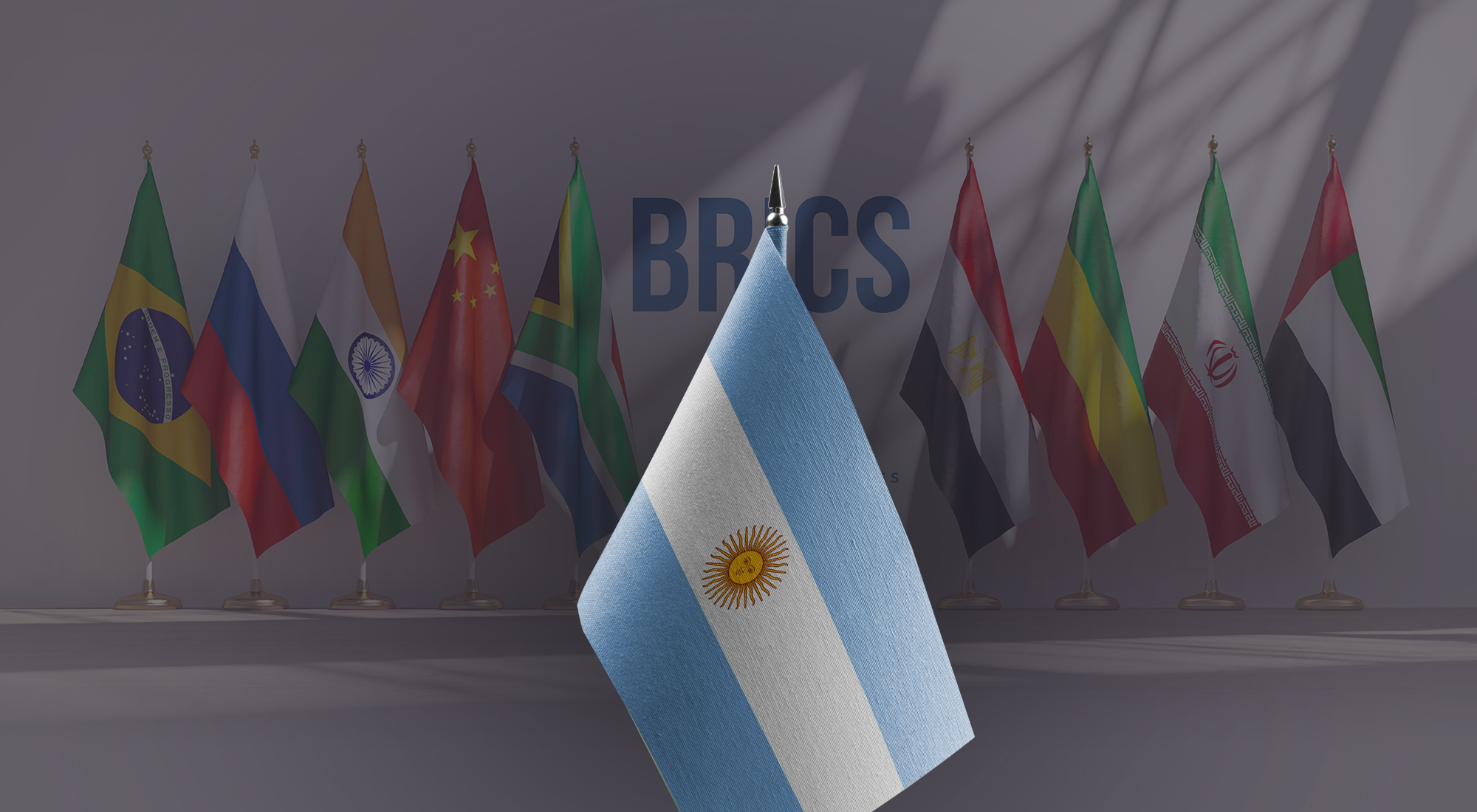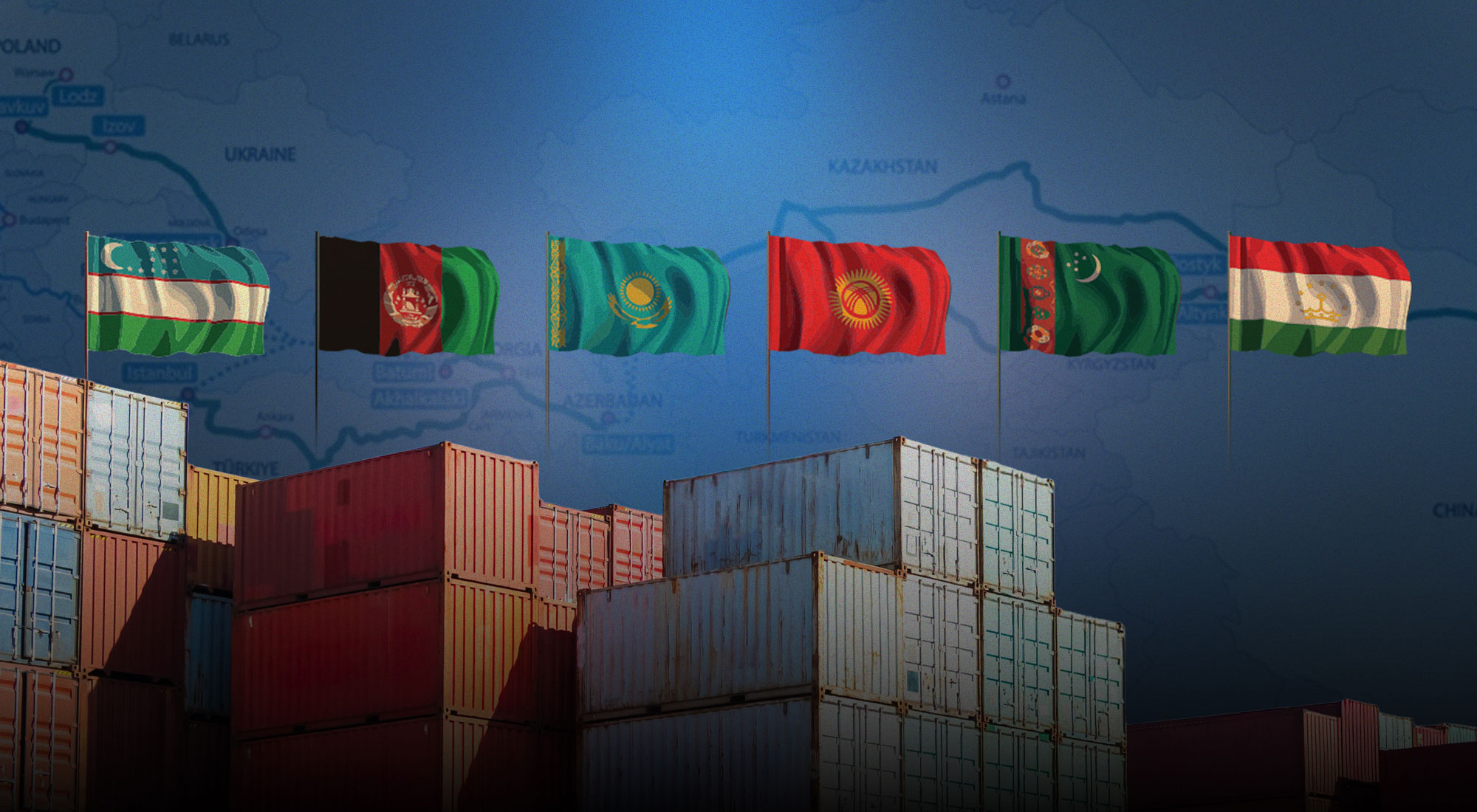In October 2023, during the Johannesburg Summit, the Republic of Argentina was formally invited to join the BRICS group as of 1 January 2024, in the format known as BRICS+. However, the new presidential administration, which took office on 10 December 2023, informed the five members of the group through letters that Argentina did not consider it appropriate to join the group. In a strong presidential political system, new administrations bring about significant changes in the country’s foreign policy. This case was no exception.
This article analyzes the different perspectives that have emerged in Argentina, either in support or opposition to the decision not to join this forum, as well as the implications that such a decision could have on bilateral relations with the members of the group.
The argument is that bilateral relations with both the new members that joined on 1 January 2024, and the original members of the group will not be affected, either politically or economically. Although Argentina’s decision can be interpreted as an overreaction of alignment with the United States (U.S.), it is based on a one-dimensional and limited interpretation of the role of BRICS in the international system and its relevance vis-à-vis the U.S. and European countries.
Introduction
Since the emergence of the BRICS Forum in 2009,[1] then known as the BRIC countries, with the accession of South Africa (the letter “S” in the acronym) in 2010, these countries are perceived either as a group focused on implementing “anti-Western” policies that could change the general direction of global international relations or as a forum that brings together diverse countries but with almost no impact on the international system.
These extreme views do not reflect the real impact of the forum and are rather ideologically motivated positions.
The macroeconomic, demographic, and geographic data speak for themselves. The BRICS member countries represent 35% of the world’s GDP, 45% of the world’s population, three nuclear powers (Russia, China and India), economies with high growth potential and large natural resources, especially in the energy sector.
However, it must be pointed out that there are major asymmetries among its members, an asymmetry that has deepened with the accession of the new members on 1 January 2024. Demographic asymmetries, economic asymmetries, asymmetries in the level of economic development, in their military capabilities or even in their international relevance.
Second, participation in the forum does not eliminate existing differences, rivalries, or conflicts between them. The tensions between India and China or between Saudi Arabia and Iran are examples of this. Despite the existence of a problematic starting point, pointing to the high asymmetries and the existence of tensions between members, the fact is that these years have led to the coordination of policies and initiatives that are having a positive impact on intra-BRICS relations and increasing the relevance of the bloc in the international system.
Initiatives such as the Shanghai-based New Development Bank (NDB),[2] the establishment of a Contingent Reserve Arrangement (CRA),[3] the conduct of trade relations in national currencies of member states (de-dollarization), or the desire to create a common currency indicate that political and economic coordination among member states could lead to structural changes in the international system.
Thus, the will to move forward in key aspects of international economic and political relations, beyond the differences and asymmetries among its members, should highlight the relevance of this forum.
Relations between Argentina and BRICS countries
Argentina maintains full diplomatic and commercial relations with all the original members of the BRICS group: Brazil, Russia, India, China and South Africa. In fact, Brazil and China represent 50% of Argentina’s foreign trade. Moreover, in the case of Brazil, it is the most relevant country for Argentina due to its participation in MERCOSUR (a South American trade bloc), its geographical proximity, and its regional and global importance.
Despite these “hard” data, this does not mean that successive Argentine governments have not seen potential problems or clashes with their ideological perspectives in relations with Brazil and China. Both the administration of Alberto Fernández (2019-2023) and that of Javier Milei (in power since December 2023) have had moments of tension with these countries, which are so structurally important for Argentina.
During the Fernandez administration, when Jair Bolsonaro was in power in Brazil, the Argentine president did not officially meet with his Brazilian counterpart, but he did visit Lula da Silva during his presidential campaign when he was in prison.[4] Although he belongs to a different party, President Milei had unconstructive words with Lula da Silva[5] who was elected for a third term as president starting 1 January 2023.
In the case of China, President Milei went from generating moments of tension by speaking of that country as a regime with which he would never be aligned because of its communism[6] to a more collaborative vision, including an official trip planned for January 2025.
Thus, although the two Argentine presidential administrations, that of Alberto Fernández and that of Javier Milei, had confrontational positions with Brazil or China, they were based on domestic political calculations and ideological motivations, although later structural conditioning factors caused these rhetorical positions to be nuanced or abandoned.
In the case of Russia, a country that Alberto Fernandez visited a few weeks before the beginning of the war in Ukraine, bilateral relations were affected by the loss of Moscow’s international prestige, but Argentina did not reduce its diplomatic relations, nor did it bow to the sanctions imposed on Russia by various countries and organizations. It only reduced the level of contacts.
As for India, on the contrary, relations have intensified in all areas, including the visit of President Fernandez to the G-20 summit in New Delhi in September 2023[7] as well as the visit of the Foreign Minister of the Milei government, Diana Mondino, in October this year.[8]
With South Africa, the other member of the BRICS group, relations have historically been more stable and less relevant, despite shared interests in the South Atlantic, something that played a prominent role in the bilateral agenda in the 1980s.
As can be seen, from the point of view of Argentine foreign policy, the BRICS are not an entity. They are very different countries in terms of their relevance for the government of Buenos Aires, and this forum does not make this complexity disappear. The relationship remains strictly bilateral, despite the advances that the BRICS group may represent in multilateral terms.
The decision of the government of President Javier Milei
The invitation to join the BRICS in August 2023 arrived in Argentina amid a very tense political situation. The ruling party, that of the then President Alberto Fernandez, had just lost the primaries, and all indications were that the first round of the presidential election, which took place on 22 October, was heading toward a polarization that was not favorable to the government.
The election of the opposition candidate, Javier Milei, with 55% of the vote in the second round held on 9 November, deepened a “rift” in all aspects: economic, domestic and foreign policy. The new government sought to actively and deeply differentiate itself from the outgoing administration, including relevant foreign policy issues such as Argentina’s incorporation into the BRICS.
There were two main reasons for Argentina’s decision: On the one hand, as mentioned, the will of the new government to implement a foreign policy completely different from that of the previous administration led it to emphasize the differences rather than the points of continuity, as can happen in any country with central issues of its foreign agenda.
On the other hand, there is a simplistic perception that the BRICS is a group of anti-Western or anti-American countries and that Argentina could not be part of this “anti-Western club” by pointing out that President Milei’s new Argentine foreign policy would focus on a very close relationship with the U.S. and Israel.
This perception does not fully reflect the complexity of the member states’ interests vis-à-vis Western countries, considering India’s close ties with the U.S. in the Indo-Pacific or those between Brasilia and Washington on security concerns in the Western Hemisphere. Neither India nor Brazil could be characterized as anti-Western.
The same could be said of some of the countries that joined the forum on 1 January, such as Egypt (whose stable post-Camp David relations with the U.S. have lasted almost half a century) or the United Arab Emirates (UAE), which has just received the status of major defense partner of the U.S.[9] (a status also held by India) after President H.H. Sheikh Mohamed bin Zayed Al Nahyan’s visit to Washington last September.
It is true that among the BRICS we find states such as Russia or China, which have strained relations with Western countries, or among the new partners, countries such as Iran. But it would be simplistic and erroneous to describe the BRICS+ as merely a forum of anti-Western countries.
We believe that the position of the new Argentine government is based not only on this conceptualization but also on the will to make explicit a foreign policy oriented toward what President Milei has called an alignment with the U.S. and Israel.[10] The Milei administration has thus prioritized bilateral relations with Washington and Tel Aviv without giving much space to forums such as BRICS+ or even those that have been as relevant for Argentina in the past, such as the G-20.
Pros and cons of Argentina’s possible participation in BRICS
President Javier Milei’s decision not to include Argentina in the BRICS sparked a debate in diplomatic and academic circles. Those who pointed out the possible advantages of Argentina’s participation in this forum emphasized increasing trade flows as well as inward investments, both of which are very important in the context of an economic crisis such as in Argentina.
However, playing the role of the devil’s advocate, it must be pointed out that trade flows between Argentina and the BRICS members are either already at a high level (as is the case with Brazil and China), or have structural limits (as is the case with Russia or South Africa), or the potential is due to factors that go beyond the relations between states. In other words, relations with Brazil and China are already excellent and deep; relations with India will develop beyond the will of the governments; and relations with Russia or South Africa have reached limits that cannot be overcome even by the will of the governments.
The data show that the BRICS do not necessarily promote intra-bloc trade because they are not a trade bloc. Nor does membership in the forum prevent the existence of differences or competition, or even conflict between the parties since national interests are not dissolved by such membership.
Those who argued that Argentina’s participation in this forum was convenient pointed out the advantages of adding a new instance of interaction with countries as relevant as India or China and the possibilities of preferential access to credit and trade instruments derived from BRICS membership.
Not even an issue as sensitive for Argentine foreign policy as the claim to full sovereignty over the Malvinas Islands (or Falklands), the South Atlantic islands and the surrounding maritime areas would benefit particularly from BRICS membership; some countries have given their support and some have not done so for other reasons, and these would not be changed.
On the contrary, those who claim that Argentina’s non-inclusion in the BRICS would be beneficial for the country did so by pointing to more elaborate arguments than simply stating that it was an anti-Western forum. In this sense, the inconvenience of participating in a forum with Russia was pointed out, especially considering how its international position has been affected since the beginning of the war in Ukraine. But it was also pointed out the inconvenience of participating in a forum with the Islamic Republic of Iran, a state that the Argentine justice system holds responsible for two terrorist attacks in Buenos Aires against the Israeli embassy in Argentina in March 1992, where 29 people died, and against the building of the Argentine Jewish community in July 1994, where 85 people died. In both cases, Iran was held responsible, diplomatic relations were strained, and Argentina’s requests for cooperation with the authorities in Tehran over the years were not resolved. In this sense, an image of an Argentine official together with Iranian officials, even in a multilateral forum, would not be well received.
It was also argued that, in a context of great power competition, the participation of a peripheral country like Argentina in a forum where China and Russia play such a prominent role would not help to gain advantages in multilateral credit organizations such as the IMF, where the U.S. or European countries have great influence.
As can be seen, beyond the central role of the president in a strongly presidential system such as Argentina’s, positions on whether or not Argentina should join the BRICS were divided, but in both cases, they were ideologically motivated positions rather than the result of an analysis of sound variables: both those who advocated membership and those who did not focus more on expectations than on concrete data.
Conclusions
Argentina’s membership in the BRICS could have been capitalized and brought tangible benefits to the country. It would have allowed Argentina to participate in a forum that, even if it does not currently offer great advantages in terms of trade or investment, could be beneficial in the future.
It would also have made it possible to create a new sphere of interaction with the new members that joined in January 2024, and although with one of them, as in the case of Iran, bilateral relations are affected diplomatically, this would have meant nothing more than a multilateral sphere of interaction, increasingly numerous, and not an agreement with Iranian policies. Relations with the Arab countries that have joined the BRICS forum, Egypt and the UAE (Saudi Arabia has not officially joined), would have meant a new area of contact.
The experience of the BRICS countries and other countries with the BRICS members shows that the forum does not make national interests disappear, nor does membership in the forum subordinate bilateral relations.
Finally, it is not an anti-Western forum or a solution to the problems of the states. It is another sphere of interaction, not institutionalized though, where middle powers can maximize their benefits through the intelligent use of diplomacy. From Argentina’s point of view, the BRICS+ should be seen as a forum or a new entity to collaborate in global governance by working with middle powers or countries of the Global South.
In an increasingly multipolar international system, any possibility of implementing a multi-vector foreign policy is an opportunity that should not be missed. Argentina’s participation in the BRICS+ forum should not be seen as a zero-sum system with Western countries, although it is true that professional diplomacy will be an essential tool to avoid such perceptions.
[1] “History of BRICS,” BRICS, https://infobrics.org/page/history-of-brics/.
[2] New Development Bank, https://www.ndb.int/.
[3] Paulo Nogueira Batista Jr., “BRICS Financial and Monetary Initiatives – the New Development Bank, the Contingent Reserve Arrangement, and a Possible New Currency,” Valdai Discussion Club, October 3, 2023, https://valdaiclub.com/a/highlights/brics-financial-and-monetary-initiatives/.
[4] https://www.infobae.com/politica/2019/07/04/alberto-fernandez-visita-a-lula-da-silva-en-la-carcel-busco-llamar-la-atencion-sobre-la-injusticia-que-implica-su-detencion/.
[5] https://www.pausa.com.ar/2024/07/milei-volvio-a-insultar-a-lula-y-lo-trato-de-corrupto/.
[6]https://www.tiempoar.com.ar/ta_article/javier-milei-sobre-china-no-voy-a-estar-alineado-con-comunistas/.
[7] https://www.casarosada.gob.ar/slider-principal/50162-el-presidente-arribo-a-la-india-para-participar-de-la-cumbre-del-g20.
[8] https://cancilleria.gob.ar/es/actualidad/noticias/visita-oficial-la-india-mondino-mantuvo-hoy-reuniones-politicas-y-comerciales-en.
[9] U.S. EMBASSY & CONSULATE IN THE UNITED ARAB EMIRATES, “U.S.-UAE JOINT LEADERS’ STATEMENT DYNAMIC STRATEGIC PARTNERS,” September 24, 2024, https://ae.usembassy.gov/u-s-uae-joint-leaders-statement-dynamic-strategic-partners/.
[10]https://elpais.com/argentina/2024-11-01/milei-prepara-una-purga-en-exteriores-tras-expulsar-a-la-canciller-por-oponerse-al-embargo-estadounidense-en-cuba.html.










